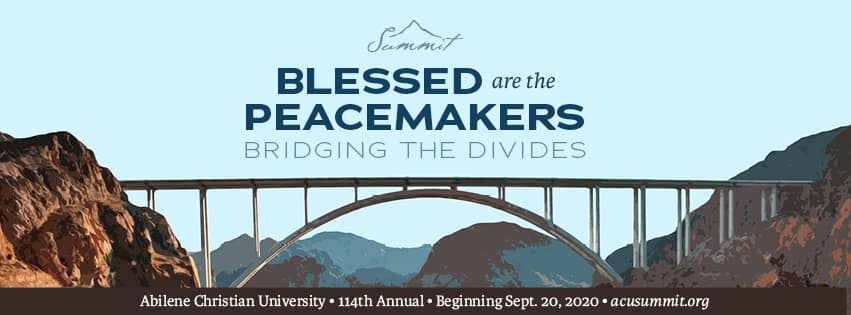 Abilene Christian University’s annual faith and spirituality lecture series has seen a good amount of evolution in its 114-year history, but even with more than a century of changes, this year’s event marks a first – an entirely virtual gathering.
Abilene Christian University’s annual faith and spirituality lecture series has seen a good amount of evolution in its 114-year history, but even with more than a century of changes, this year’s event marks a first – an entirely virtual gathering.
Summit typically involves church leaders, preachers, theologians and a variety of other interested Christ followers traveling to Abilene for a three-day series of speakers, classes, worship and discussion around a spiritually focused theme. This year, it will involve webinars, speakers via livestream, e-books and even an art exhibit on Summit’s 2020 theme of “Blessed Are the Peacemakers.”
Another change to the typical structure of Summit is the timeline; instead of being compressed into three days, the offerings will be spread from late September throughout October and part of November. The event kicks off with four theme speakers, one per day, on Sept. 20-23. These events are open to anyone and do not require registration.
Theme Speakers
- “Old Dreams and New Visions,” by Ian Nickerson, ministering evangelist at Minda Street Church of Christ in Abilene, 7 p.m. Sept. 20
- “No Justice, No Peace,” by Jessica Goudeau, author of After the Last Border: Two Families and the Story of Refuge in America, 11 a.m. Sept. 21
- “Becoming One Church in a Divided Land,” by Alan Hilton, executive director of House United, 11 a.m. Sept. 22
- “Christ of the Breadlines: Peacemaking Between Rich and Poor,” by Richard Beck, professor and chair of the Department of Psychology at ACU, 11 a.m. Sept. 23
With a free registration, however, attendees can have access to 12 additional pathways – specific areas of study within the peacemaking theme.
“Now, more than ever, as Christ followers, we are called and need to be peacemakers,” said Leah Andrews, co-director of Summit. “Nothing is more urgent than for us to take up that aspect of following Christ.”
Pathway themes emphasize that relevance with topics including “Bringing Peace to Family Crises,” “Peacemaking in the Muslim World,” “Peacemaking on the Southern Border,” and “A Christian Response to White Supremacy.”
Some of the presentations will be recorded and released on the website while others will be in a webinar format. Registration is only required to attend the webinars on the presentation date and take part in the conversations. All presentations and webinars will be posted online after the event and are available free of charge.
Each pathway also will have a guidebook, in e-book format, available for download shortly after the conclusion of the pathway events. These are intended to serve as resources for churches to use in Bible classes and small groups, Andrews said.
Even before the pandemic forced many large events to retool, a virtual experience had been in the sights of the Summit team for some time.
“We had imagined an online presence for Summit, where we could reach tens of thousands across the globe, yet we were busy planning an in-person gathering on campus,” Andrews said. “We felt like we were standing on the edge, peeking in on what could be in the world of a virtual Summit. The virus and resulting restrictions gave us a firm shove over that threshold. We are prayerfully and gratefully hoping to follow God’s lead into this new presentation platform.”
Access to speakers, not just audiences, is another benefit of moving Summit online. Martin Accad, chief academic officer and director of the Institute of Middle East Studies at the Arab Baptist Theological Seminary in Beirut, Lebanon, will speak as part of the “Peacemaking in the Muslim World” pathway, a feat that would have been impossible for an in-person event.
Learn more about speakers, times and pathways and register for the event at acusummit.org.
